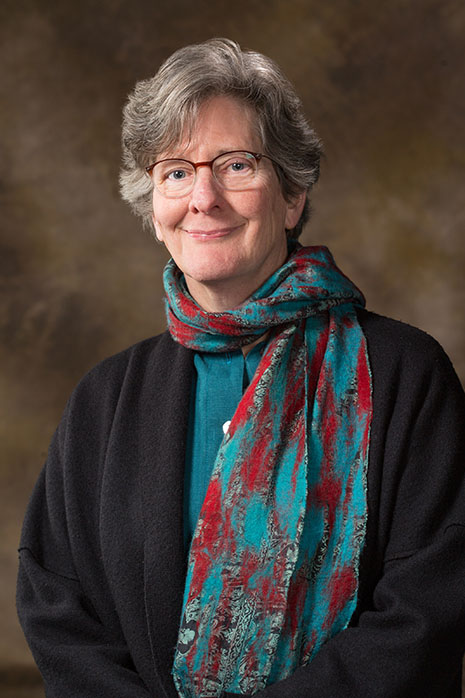Lynda Coon Chosen to Lead U of A Honors College
FAYETTEVILLE, Ark. – Lynda Coon, a professor of history who has taught and mentored students in the University of Arkansas Honors College for many years, has been named as the new dean of the college, following a national search to replace Bob McMath, who retired in August 2014.
She will begin her new duties on June 1.
“I am honored to be selected as the second dean of the Honors College,” said Coon. “There are many reasons for my enthusiasm: the team, both internal and external to the college, the extraordinary students, the solid foundation that has already been built, and the new directions ahead.”
Coon is currently associate dean of fine arts and humanities in the J. William Fulbright College of Arts and Sciences and director of the Religious Studies Program in the college. In 1995 she helped launch the Honors Humanities Project in the J. William Fulbright College of Arts and Sciences. The project is an interdisciplinary four-semester sequence of courses taught by teams of top professors. It has become a cornerstone experience for many honors students.
Coon has taught many honors courses and mentored nearly two dozen honors students on their thesis projects.
“I am extremely pleased that Lynda Coon applied for and accepted this position,” said Sharon Gaber, provost and vice chancellor for academic affairs. “After a national search we found that we had the best person right here on campus. I would like to thank the search committee, which was chaired by Javier Reyes, for their diligent work. I would also like to thank Curt Rom for the outstanding job he has done as interim dean for the Honors College.”
“I am confident that Lynda Coon will be an excellent dean. She is more than qualified as a teacher, researcher and administrator to lead the Honors College. More, she has a strong vision of what the Honors College can and should become.”
Coon outlined this vision in her application letter to the search committee. She emphasized the importance of undergraduate research as part of the University of Arkansas’ strategic plan, and discussed ways to involve more honors students in ongoing research projects. She said she would encourage more honors students to engage in service-learning projects, here and abroad.
In addition Coon put forward a plan to increase the diversity of the Honors College by recruiting valedictorians at every high school Arkansas and by collaborating closely with programs and administrative units committed to bringing more underrepresented groups to campus.
“I also envision the Honors College as a place where distinguished visiting scholars could find a home,” she wrote, “providing the institution with public lectures, one-on-one tutorials with advanced Honors College Fellows, and outreach to University of Arkansas colleagues. This program would lead to more national and international visibility for the University.”
Coon also suggested creating an advisory board made up of faculty members who have been involved in Honors College programs, to increase faculty engagement.
“Clearly, the Honors College presents any candidate with a number of exciting possibilities,” she said. “The Honors College already has a professional, expert staff, a generous endowment, national visibility, and a beautiful setting. The opportunity to move forward from this foundation is an unparalleled one.”
Coon earned a bachelor’s degree in history at James Madison University, and her master’s and doctoral degrees at the University of Virginia.
She joined the University of Arkansas faculty in 1990 and became a full professor in 2011. She served as chair of the History Department from 2008 to 2013. She is the author of two books on the history of Christianity in late antiquity and the early Middle Ages.
Coon is a member of the University of Arkansas Teaching Academy and has received three top teaching honors at the university: the Fulbright College Master Teacher Award in 1998, the Charles and Nadine Baum University of Arkansas Teaching Award in 2000, and the University of Arkansas Honors College Distinguished Faculty Award in 2014.
About the Honors College: The University of Arkansas Honors College was established in 2002 and unites the university’s top undergraduate students and professors in a learning environment characterized by discovery, creativity and service. Each year the Honors College awards up to 90 freshman fellowships that provide $70,000 over four years, and more than $1 million in undergraduate research and study abroad grants. The Honors College is nationally recognized for the high caliber of students it admits and graduates. Honors students enjoy small, in-depth classes, and programs are offered in all disciplines, tailored to students’ academic interests, with interdisciplinary collaborations encouraged. One hundred percent of Honors College graduates have engaged in mentored research.
About the University of Arkansas: The University of Arkansas provides an internationally competitive education for undergraduate and graduate students in more than 200 academic programs. The university contributes new knowledge, economic development, basic and applied research, and creative activity while also providing service to academic and professional disciplines. The Carnegie Foundation classifies the University of Arkansas among only 2 percent of universities in America that have the highest level of research activity. U.S. News & World Report ranks the University of Arkansas among its top American public research universities. Founded in 1871, the University of Arkansas comprises 10 colleges and schools and maintains a low student-to-faculty ratio that promotes personal attention and close mentoring.
Contacts
Sharon Gaber, provost and vice chancellor
Academic Affairs
479-575-5459, sgaber@uark.edu
Laura Jacobs, associate vice chancellor
University Relations
479-575-5555,
laura@uark.edu
